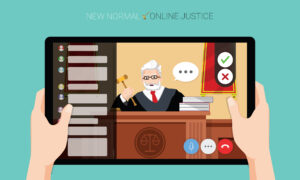 COVID-19 changed everything; no matter how you look at it, things will never be quite the same. Since the start of the pandemic, social distancing required creative thinking by lawyers and judges. This is because the only way to continue practicing law and maintaining business operations throughout the pandemic was to take advantage of remote working technologies, including virtual court proceedings.
COVID-19 changed everything; no matter how you look at it, things will never be quite the same. Since the start of the pandemic, social distancing required creative thinking by lawyers and judges. This is because the only way to continue practicing law and maintaining business operations throughout the pandemic was to take advantage of remote working technologies, including virtual court proceedings.
Over time, judges became accustomed to and appreciative of the many benefits of virtual court proceedings, with many reporting that they expected them to continue even after the pandemic ends. Virtual courts have been so prevalent that Zoom has an entire section of its website devoted to hybrid and virtual courts and the tools needed to support them.
The Johnny Depp defamation trial was a great example of this trend in action and showed how courts will likely be conducted moving forward. Testimony from many witnesses occurred in person, while others appeared via videoconference. Of those participating remotely, some testified live, and the testimony of others was prerecorded.
That “hybrid” trial was a sign of things to come. Moving forward, courts will undoubtedly embrace flexibility to ensure the ability to remain operable — and efficient — no matter the circumstances.
But don’t take my word for it; the writing is on the wall. Jurisdictions across the country have taken steps to enact permanent rules that allow remote court appearances to continue. For example, efforts to enable remote court appearances for more routine matters are underway in Michigan. Similarly, Georgia recently greenlighted remote appearances for attorneys arguing before the Georgia Court of Appeals. Maryland also changed court rules to allow remote appearances, but only for “procedural matters, uncontested facts, or legal arguments.”
However, despite the convenience and many other benefits of remote court appearances, not everyone is on board. Trial attorneys, especially those handling criminal defense matters, are often the most skeptical about the advisability and feasibility of virtual proceedings, especially when it comes to trials.
This is because constitutional rights can be negatively impacted during virtual trials, including the Sixth Amendment’s right to confront witnesses. Virtual proceedings also make it much more difficult to assess the impact of testimony and the arguments being made on the trier of fact. Remote appearances can also dramatically affect courtroom dynamics, often to the detriment of the accused.

Take Control Of Your Firm’s Finances With Tools Built For Success
Position your firm for long-term growth with better financial visibility and control. Learn how to track performance, manage spending, and plan strategically—download the full e-book now.
Constitutional claims have been raised in noncriminal proceedings as well. For example, in Connecticut, constitutional challenges to remote trials were raised by parents in three child custody disputes. They alleged that the remote procedures affected the ability to physically confront witnesses, along with other constitutional claims. The Connecticut Supreme Court disagreed but, in one of the cases, acknowledged that virtual court appearances aren’t always appropriate:
Although we do not address whether a trial court may conduct virtual trials in circumstances other than during a pandemic, we take this opportunity to emphasize the importance of ensuring equal access to justice when a court undertakes a virtual trial. Equal access to justice is particularly significant in the context of virtual hearings and trials given the digital divide.”
In other words, there are still many wrinkles to iron out. Even so, the virtual court transition has begun, and as a result, the halls of justice will be forever changed. In-person proceedings aren’t going away, but there will be fewer, especially for more routine matters.
The good news is that technology is readily available to support this transition. No matter what aspect of remote litigation you’re looking to address, there is software that fills the gap. In recent months, I’ve focused on many of those software categories in my ABA Journal columns. So whether you’re in the market for remote deposition software, remote court transcription tools, trial presentation software, or e-filing services, I’ve got you covered.
Over the past year, I’ve also written articles about many other cloud-based software tools that enable remote work. Even if you’re not seeking virtual trial tools, there are still many software categories to choose from that facilitate the ability to practice law and manage your firm from anywhere, including lead management, billing and invoicing, payment processing, document management and assembly, law practice management, or practice-area specific software.
The pandemic has permanently and significantly impacted how and where lawyers practice law. There’s no looking back. But, moving forward, it’s still unclear how the dust will settle and what the practice of law and trials will look like in the months and years to come. But one thing is certain: practicing law remotely is here to stay. Is your law firm ready for what the future will bring?
Nicole Black is a Rochester, New York attorney and Director of Business and Community Relations at MyCase, web-based law practice management software. She’s been blogging since 2005, has written a weekly column for the Daily Record since 2007, is the author of Cloud Computing for Lawyers, co-authors Social Media for Lawyers: the Next Frontier, and co-authors Criminal Law in New York. She’s easily distracted by the potential of bright and shiny tech gadgets, along with good food and wine. You can follow her on Twitter at @nikiblack and she can be reached at niki.black@mycase.com.
